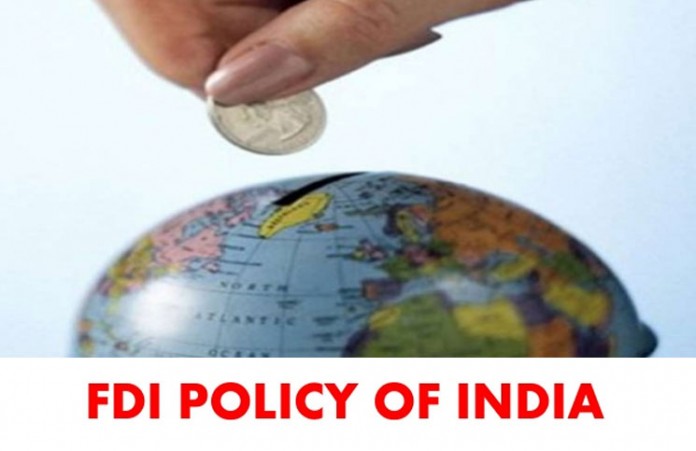n this blog post, Ankit Sahoo, an Associate with Hammurabi and Solomon, Delhi and a student pursuing a Diploma in Entrepreneurship Administration and Business Laws from NUJS, Kolkata, discusses Foreign Direct Investment with regards to the e-Commerce sector.
E-Commerce
E-Commerce does not have a standard definition, but it can be defined in a general sense as a method of conducting business through electronic means rather than through conventional physical means. “Electronic means” shall mean and include ‘click and buy’ using computers or through ‘m-commerce’ using smartphones. The term E-Commerce is not only an act of purchasing goods and/or availing services but also includes all other activities associated with a transaction such as delivery, payment facilitation, supply chain and service management.
The most well-known business models for e-commerce business in India are:
- Business to Consumer (B2C) model is where businesses directly deal with the consumers. The conventional B2C model distribution channel involved a distributor/wholesaler who acted as a link between the manufacturer and the retailer. The retailer was the ultimate middleman who interacted with the end consumer.
- Business to Business (B2B) model is where transactions are between companies, such as manufacturer and wholesalers or wholesalers and retailers. IndiaMART.com is one of the biggest online markets which provide a platform for the businesses to find other competitive suppliers.
- Consumer to Consumer (C2C) model is where transactions are between consumer and consumer. Traditionally consumers dealt with other consumers, but rarely these activities were in a commercial sense. The emergence of E-Commerce has provided a platform for the consumers to trade on with other consumers. The best example for such model is eBay.
FDI Policy For E-Commerce In India
The Department of Industrial Policy and Promotion (“DIPP”), Ministry of Commerce and Industry, formulates policies on FDI through Press Notes and Press Releases which are notified by the Reserve Bank of India (“RBI”) as amendments to Foreign Exchange Management (Transfer or Issue of Security by Persons Resident Outside India) Regulations, 2000.
The liberalism of E-Commerce in India is often a debated and sometimes a controversial topic. The E-Commerce sector in India not only faces tough competition from the conventional retail lobbies but also suffers restrictions from the government policies on Foreign Direct Investment (“FDI policy”)[1]. The government brought about some relaxation last year by allowing a single brand retail entity operating a brick and mortar store to undertake retail trading through E-Commerce, although the confusion prevailed. The DIPP in order to provide clarity to extant FDI policy issued guidelines for foreign direct investment in E-Commerce sector (“Guidelines”)[2].
The FDI policy issued by DIPP provides two entry routes for investment:
- Automatic Route where foreign investments do not require prior approval of the government and
- Government / Approval Route where prior approval of the Government of India through Foreign Investment Promotion Board (“FIPB”) is required.
 DIPP in the Guidelines has attempted to distinguish between inventory based model (“Inventory Model”) and marketplace model (“Marketplace Model”) of E-Commerce. The inventory based model as defined in the Guidelines is an E-Commerce activity where the inventory of goods and services is owned by E-Commerce entity[3] and is sold to the consumers directly, whereas, in the Marketplace Model is a model where the E-Commerce entity provides an IT platform on a digital and electronic network and acts as a facilitator between the buyer and the seller.
DIPP in the Guidelines has attempted to distinguish between inventory based model (“Inventory Model”) and marketplace model (“Marketplace Model”) of E-Commerce. The inventory based model as defined in the Guidelines is an E-Commerce activity where the inventory of goods and services is owned by E-Commerce entity[3] and is sold to the consumers directly, whereas, in the Marketplace Model is a model where the E-Commerce entity provides an IT platform on a digital and electronic network and acts as a facilitator between the buyer and the seller.
According to the Guidelines, FDI is not permitted in the Inventory Model of E-Commerce, but 100% FDI has been permitted in the Marketplace Model under the automatic route. The E-Commerce marketplace may provide support services to sellers in warehousing and logistics but shall not exercise ownership on the inventories. Such ownership over the inventories shall render the business an Inventory Model.
FDI In B2B And B2C E-Commerce
The Guidelines have put the recent FDI changes to the E-Commerce sector in a consolidated manner as stated below:
- 100% FDI under the automatic route is permitted in B2B E-Commerce i.e. Marketplace Model.
- No FDI is permitted in the B2C E-Commerce i.e. Inventory Model except to the following circumstances:
- A manufacturer is permitted to sell its products manufactured in India through E-Commerce retail.
- A single brand retail entity operating through brick and mortar store is permitted to undertake retail trading through E-Commerce.
- An Indian manufacturer is permitted to sell its own single brand products through E-Commerce retail. Indian manufacturer would be the investee company, which is the owner of the Indian brand and which manufacturers in India, in terms of value, at least 70% of its products in-house, and sources, at most 30% from Indian manufacturers.[4]
Sectoral Conditions Of The Guidelines
The Guidelines provide for certain conditions that are applicable to the E-Commerce sector:
- An E-Commerce marketplace entity is permitted to enter into transactions and provide support services to sellers with regard to warehousing, logistics, order fulfilment, call centre, payment collection, etc. but is not allowed to exercise ownership over the inventories, as such ownership shall render the transaction into an Inventory Model E-Commerce.

- An E-Commerce entity is not permitted to affect its sales more than 25% through its marketplace from one vendor or their group of companies. Many E-Commerce marketplace entities used to largely sourced from one or two vendors without any cap on the percentage of sales from that particular vendor(s) which are going to be largely affected.
- In the Marketplace Model of E-Commerce, the goods/services that are offered for sale electronically on the E-Commerce entity’s website should clearly provide the name, address and other contract details of the seller. The seller becomes responsible for the delivery of the products and customer satisfaction post sale of the products.
- In Marketplace Model, payment for the sale of goods/service may be facilitated by the E-Commerce entity inconsistency with the guidelines of RBI.
- All warranty/guarantee of goods and services sold shall be the responsibility of the seller in a Marketplace Model.
- The E-Commerce marketplace entities shall not directly or indirectly influence the sale price of goods and services and shall maintain the level playing field. The feud between the E-Commerce entities (online) and conventional physical retailers (offline). The offline retailers allege the online retailers of predatory pricing and influencing prices of the goods and services to offer unsustainable discounts and hence the onus of maintaining a level playing field is to the E-Commerce entities.
Conclusion
The Guidelines have to a great extent, in a consolidated manner, replicated the recent amendments to the existing FDI policy on E-Commerce and a lot of the conditions laid down in the Guidelines like providing support services to the seller like warehousing, logistics, order fulfillment, payment collection in compliance with the RBI guidelines are already in practice by those in the E-Commerce Marketplace Model.
The applicability to the Guidelines by the E-Commerce entities engaged in the business of services may result in indistinctness since a lot of services like music, videos, software, etc. may also be considered as goods which can be bought and sold.[5] As the Guidelines has not defined these expressions, the restrictions on the E-Commerce entities to not to ‘directly or indirectly influence the sales price of goods and services’ and to ‘ensure a level playing field’ appear ambiguous and unreasonable.
References:
[1] Press Note 12 of 2015 dated 24th November 2015
[2] Press Note No. 3 of 2016 on March 29, 2016
[3] E-Commerce entity means a company incorporated under the Companies Act 1956/2013 or a foreign company under Section 2(42) of the Companies Act, 2013 or an office, branch or agency in India as provided in section 2(v)(iii) of FEMA, 1999, owned or controlled by a person resident outside India and conducting the E-Commerce business.
[4] Press Note No. 3 of 2016 on March 29, 2016
[5] Tata Consultancy Services v. State of Andhra Pradesh [(2005) 1 SCC 308]
 Serato DJ Crack 2025Serato DJ PRO Crack
Serato DJ Crack 2025Serato DJ PRO Crack










 Allow notifications
Allow notifications


